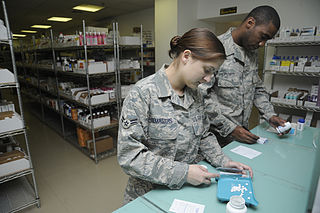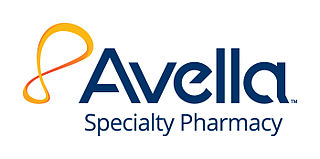
Osco Drug and Sav-on Drugs were the names of a pair of chain pharmacies that operated in the United States. Osco Drug was founded by the Skaggs family. Alpha Beta grocery store was purchased by American Stores in 1961. Skaggs Drug Centers bought American Stores in 1979 and assumed the American Stores name. Sav-on Drugs was a California-based pharmacy chain that was acquired by Osco's parent company in 1980. Both Osco and Sav-on stores eventually came under the ownership of American Stores, then Albertsons, and finally SuperValu before the stores were sold off.

A pharmacist, also known as a chemist in Commonwealth English, is a healthcare professional who specializes in the preparation, dispensing, and management of medications. A pharmacist provides pharmaceutical advice and guidance, often serving as a primary care provider in the community, and offering other services, such as health screenings and immunizations.
Shoppers Drug Mart Inc., commonly known as Shoppers is a Canadian retail pharmacy chain based in Toronto, Ontario. It has more than 1,300 stores in ten provinces and two territories.

Pharmacy is the science and practice of discovering, producing, preparing, dispensing, reviewing and monitoring medications, aiming to ensure the safe, effective, and affordable use of medicines. It is a miscellaneous science as it links health sciences with pharmaceutical sciences and natural sciences. The professional practice is becoming more clinically oriented as most of the drugs are now manufactured by pharmaceutical industries. Based on the setting, pharmacy practice is either classified as community or institutional pharmacy. Providing direct patient care in the community of institutional pharmacies is considered clinical pharmacy.

The Jean Coutu Group (PJC) Inc. is a Canadian drugstore chain headquartered in Varennes, Quebec. It has more than 400 franchised locations in New Brunswick, Ontario and Quebec under the PJC Jean Coutu, PJC Clinique, and PJC Santé banners. The company was once the third largest distributor and retailer of pharmaceuticals and related products in North America, with nearly 2,200 drug stores. Its American stores have been sold to Rite Aid.

CVS Pharmacy, Inc. is an American retail corporation. A subsidiary of CVS Health, it is headquartered in Woonsocket, Rhode Island. Originally named the Consumer Value Stores, it was founded in Lowell, Massachusetts in 1963.
Walgreens is an American company that operates the second-largest pharmacy store chain in the United States, behind CVS Health. It specializes in filling prescriptions, health and wellness products, health information, and photo services. It was founded in Chicago in 1901, and is headquartered in the Chicago suburb of Deerfield, Illinois. On December 31, 2014, Walgreens and Switzerland-based Alliance Boots merged to form a new holding company, Walgreens Boots Alliance. Walgreens became a subsidiary of the new company, which retained its Deerfield headquarters and trades on the Nasdaq under the symbol WBA. In 2021 the company was found by a federal jury to have substantially contributed to the opioid crisis.

A pharmacy technician performs pharmacy-related functions. Training, certification, licensing, and actual practice of pharmacy technicians varies not only worldwide but in some countries regionally as well as by employer.
An independent pharmacy is a retail pharmacy that is not directly affiliated with any chain of pharmacies and is not owned by a publicly traded company. Independent pharmacies are pharmacist-owned, privately held businesses in varying practice settings. They include single-store operations, pharmacist-owned multiple store locations, franchise, compounding, long-term care (LTC), specialty, and supermarket pharmacy operation. Independent pharmacy owners generally have more flexibility to build personalized customer relationships and they strive to differentiate their services from big-chain corporations.
CVS Health Corporation is an American healthcare company that owns CVS Pharmacy, a retail pharmacy chain; CVS Caremark, a pharmacy benefits manager; and Aetna, a health insurance provider, among many other brands. The company is the world's second largest healthcare company, behind UnitedHealth Group. In 2023, the company was ranked 64th in the Forbes Global 2000.

Clinical pharmacy is the branch of pharmacy in which clinical pharmacists provide direct patient care that optimizes the use of medication and promotes health, wellness, and disease prevention. Clinical pharmacists care for patients in all health care settings but the clinical pharmacy movement initially began inside hospitals and clinics. Clinical pharmacists often work in collaboration with physicians, physician assistants, nurse practitioners, and other healthcare professionals. Clinical pharmacists can enter into a formal collaborative practice agreement with another healthcare provider, generally one or more physicians, that allows pharmacists to prescribe medications and order laboratory tests.
Pharmacy in China involves the activities engaged in the preparation, standardization and dispensing of drugs, and its scope includes the cultivation of plants that are used as drugs, the synthesis of chemical compounds of medicinal value, and the analysis of medicinal agents. Pharmacists in China are responsible for the preparation of the dosage forms of drugs, such as tablets, capsules, and sterile solutions for injection. They compound physicians', dentists', and veterinarians' prescriptions for drugs. Pharmacological activities are also closely related to pharmacy in China.

A pharmacy is a premises which provides pharmaceutical drugs, among other products. At the pharmacy, a pharmacist oversees the fulfillment of medical prescriptions and is available to counsel patients about prescription and over-the-counter drugs or about health problems and wellness issues. A typical pharmacy would be in the commercial area of a community.
Medication therapy management, generally called medicine use review in the United Kingdom, is a service provided typically by pharmacists, medical affairs, and RWE scientists that aims to improve outcomes by helping people to better understand their health conditions and the medications used to manage them. This includes providing education on the disease state and medications used to treat the disease state, ensuring that medicines are taken correctly, reducing waste due to unused medicines, looking for any side effects, and providing education on how to manage any side effects. The process that can be broken down into five steps: medication therapy review, personal medication record, medication-related action plan, intervention and or referral, and documentation and follow-up.
There are approximately 88,000 pharmacies in the United States. Over half are located within drug stores, grocery stores, hospitals, department stores, medical clinics, surgery clinics, universities, nursing homes, prisons, and other facilities. The remaining pharmacies are considered to be independent or privately owned. The top 25 pharmacy chain stores represent about 38,000 pharmacy locations in the U.S. and employ about 149,000 on-staff pharmacists. California has 8,015 pharmacies, the most of any state. Texas, Florida, New York, and Pennsylvania round out the top five states for pharmacy locations. Nationwide, the number of community pharmacies increased by 6.3% between 2007-2015, and the number of pharmacies per 10,000 people (2.11) did not change. However, the number of pharmacies per-capita varies substantially across counties, ranging from 0 to 13.6 per- 10,000 people in 2015.

Telepharmacy is the delivery of pharmaceutical care via telecommunications to patients in locations where they may not have direct contact with a pharmacist. It is an instance of the wider phenomenon of telemedicine, as implemented in the field of pharmacy. Telepharmacy services include drug therapy monitoring, patient counseling, prior authorization and refill authorization for prescription drugs, and monitoring of formulary compliance with the aid of teleconferencing or videoconferencing. Remote dispensing of medications by automated packaging and labeling systems can also be thought of as an instance of telepharmacy. Telepharmacy services can be delivered at retail pharmacy sites or through hospitals, nursing homes, or other medical care facilities.

Avella Specialty Pharmacy, formerly known as The Apothecary Shops, is an American specialty pharmacy company. Avella is headquartered in Phoenix, Arizona, and has facilities in eight states. Dr. John D. Musil is the company's founder. Rebecca Shanahan is the CEO.
Specialty pharmacy refers to distribution channels designed to handle specialty drugs — pharmaceutical therapies that are either high cost, high complexity and/or high touch. High touch refers to higher degree of complexity in terms of distribution, administration, or patient management which drives up the cost of the drugs. In the early years specialty pharmacy providers attached "high-touch services to their overall price tags" arguing that patients who receive specialty pharmaceuticals "need high levels of ancillary and follow-up care to ensure that the drug spend is not wasted on them." An example of a specialty drug that would only be available through specialty pharmacy is interferon beta-1a (Avonex), a treatment for MS that requires a refrigerated chain of distribution and costs $17,000 a year. Some specialty pharmacies deal in pharmaceuticals that treat complex or rare chronic conditions such as cancer, rheumatoid arthritis, hemophilia, H.I.V. psoriasis, inflammatory bowel disease (IBD) or Hepatitis C. "Specialty pharmacies are seen as a reliable distribution channel for expensive drugs, offering patients convenience and lower costs while maximizing insurance reimbursements from those companies that cover the drug. Patients typically pay the same co-payments whether or not their insurers cover the drug." As the market demanded specialization in drug distribution and clinical management of complex therapies, specialized pharma (SP) evolved.„ Specialty pharmacies may handle therapies that are biologics, and are injectable or infused. By 2008 the pharmacy benefit management dominated the specialty pharmacies market having acquired smaller specialty pharmacies. PBMs administer specialty pharmacies in their network and can "negotiate better prices and frequently offer a complete menu of specialty pharmaceuticals and related services to serve as an attractive 'one-stop shop' for health plans and employers."
Diplomat Pharmacy, Inc. is the largest independent provider of specialty pharmacy services in the United States. The company partners with manufacturers, payers, providers, hospitals, and more. Headquartered in Flint, Michigan, Diplomat has facilities across the United States and dispenses drugs in all 50 states. Diplomat offers specialized medication and medication management programs for patients with complex and chronic conditions such as cancer, hepatitis, multiple sclerosis, HIV and others.









